Seventy-five years ago, on 8 May, 1945, World War II officially ended in Europe. As expected, the news caused great jubilation.
On May 7, under the front-page headline “NAZIS QUIT,” the Sudbury Star reported: “V-E Day minus one was most noted in Sudbury this morning for women with parcels in arms and men with bottles. When the news of the unconditional surrender of Germany swept the city this morning, housewives decided telepathically on a concerted rush to replenish cupboards ... The food stores, the liquor store and beer warehouse enjoyed a pre-Christmas deluge.”
Sudbury Mayor William S. Beaton went on the radio and asked “all business places … to close for the remainder of the afternoon and to proclaim Tuesday, May 8, 1945, as V-E Day.”
The Star reported the nearly spontaneous holiday: “The secondary schools declared studies off at mid-morning; the primary school students went on strike at 12 for a holiday, but the mayor’s proclamation settled this issue in favour of the children. The stock exchange and mining market cancelled trading at 11 a.m. after one hour’s business, the shortest official securities’ day on record.”
On the radio, Beaton thanked everyone who had made sacrifices during the war, but reminded his listeners that the Japanese enemy remained undefeated.
The end had come suddenly so celebrations were impromptu and haphazard. An electrical outage meant that the news of Germany’s pending capitulation did not reach Falconbridge, where production continued as usual.
Canada’s minister responsible for defence production, C.D. Howe, had asked the mining companies to “stay on the job, regardless of victory in Europe,” and Inco announced its intention of doing so. At the same time, one administrator indicated that management could not guarantee compliance by the workers.
The Rotary Club cancelled its weekly meeting, but Judge Edmund Proulx indicated that court would continue “V-E Day or not, holiday notwithstanding.”
Much private sadness tempered the public celebrations. The Star noted on May 7 that at least 316 Sudbury men had been killed in action. The family separations continued because serving men and women would only slowly be demobilized.
One of the largest groups of Sudbury soldiers, for example, returned after mid-November 1945. Further, at Creighton Mine the ceremony honouring the 97 who returned, of the 99 who enlisted, did not occur until January 1946.
Sadder than the slow return were all those who survived, but were injured and died in the next months. At least 10 from Sudbury died between May 8, 1945 and October 1947. Those who had been prisoners of war, some since the failed Dieppe raid of August 1942, only slowly made it back to Canada via England, some as late as mid-1946.
Those who had special trades in communications kept working at restoring or installing systems throughout 1946 for the occupying troops.
Reinforcing the sadness was the continuation of wartime conditions for several years. During August 1945, people were still being asked to buy Victory bonds and to sacrifice for the war. Relief collections of clothing and money continued long after the war. In September and October 1945, the Sudbury Star reported the results of clothing drives for the coming winter, and next year it frequently reported on the rising relief costs.
The newspaper noted the issuing of 37,200 ration books and the struggles to get them — in September1946. Further, many widows had to fight for pensions or compensation for years, even decades.
May 8, 1945 was cause for celebration, but it should also have been cause for reflection. Just as the present virus war may someday be officially declared over, its effects and its grief will last much longer. Ending wars is far more prolonged and painstaking than issuing official pronouncements.
Dr. Dieter K. Buse is Professor Emeritus, History, Laurentian University. He has published many studies on modern European history and more recently on our region, including Come on Over: Northeastern Ontario (co-authored with Graeme S. Mount) and the two volume work, Untold: Northeastern Ontario’s Military Past vol. 1: 1662-World War I and vol. 2: World War II-Peacekeeping (available from Latitude 46, Sudbury).
